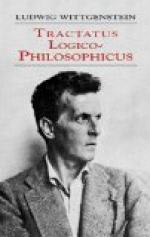6.3611 We cannot compare a process with ’the passage of time’—there is no such thing—but only with another process (such as the working of a chronometer). Hence we can describe the lapse of time only by relying on some other process. Something exactly analogous applies to space: e.g. when people say that neither of two events (which exclude one another) can occur, because there is nothing to cause the one to occur rather than the other, it is really a matter of our being unable to describe one of the two events unless there is some sort of asymmetry to be found. And if such an asymmetry is to be found, we can regard it as the cause of the occurrence of the one and the non-occurrence of the other.
6.36111 Kant’s problem about the right hand and the left hand, which cannot be made to coincide, exists even in two dimensions. Indeed, it exists in one-dimensional space in which the two congruent figures, a and b, cannot be made to coincide unless they are moved out of this space. The right hand and the left hand are in fact completely congruent. It is quite irrelevant that they cannot be made to coincide. A right-hand glove could be put on the left hand, if it could be turned round in four-dimensional space.
6.362 What can be described can happen too: and what the law of causality is meant to exclude cannot even be described.
6.363 The procedure of induction consists in accepting as true the simplest law that can be reconciled with our experiences.
6.3631 This procedure, however, has no logical justification but only a psychological one. It is clear that there are no grounds for believing that the simplest eventuality will in fact be realized.
6.36311 It is an hypothesis that the sun will rise tomorrow: and this means that we do not know whether it will rise.
6.37 There is no compulsion making one thing happen because another has happened. The only necessity that exists is logical necessity.
6.371 The whole modern conception of the world is founded on the illusion that the so-called laws of nature are the explanations of natural phenomena.
6.372 Thus people today stop at the laws of nature, treating them as something inviolable, just as God and Fate were treated in past ages. And in fact both are right and both wrong: though the view of the ancients is clearer in so far as they have a clear and acknowledged terminus, while the modern system tries to make it look as if everything were explained.
6.373 The world is independent of my will.
6.374 Even if all that we wish for were to happen, still this would only be a favour granted by fate, so to speak: for there is no logical connexion between the will and the world, which would guarantee it, and the supposed physical connexion itself is surely not something that we could will.
6.375 Just as the only necessity that exists is logical necessity, so too the only impossibility that exists is logical impossibility.




